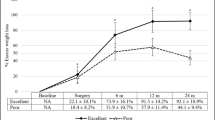Abstract
Background
Clinicians working with patients who undergo bariatric surgery have found loss to follow-up challenging; however, the impact of this factor on postsurgical weight loss has not been adequately examined. The purpose of this study was to determine whether patients who returned for office visits after their gastric bypass (GBP) lost more weight than those who did not.
Methods
All patients treated with GBP by a single surgeon during 2003 were eligible. Measured weights were obtained from surgical and local physician records over 24 months after GBP. Attender status was defined by whether patients attended the 12-month post-GBP visit, and number of visits attended was recorded. When measured weights were not available at 1.5, 6, 12, or 24 months, the previous measured weight was carried forward. Weight loss over time was compared by attender group and by visit number using mixed models and ≥50% excess weight loss (EWL) by logistic regression.
Results
Weight loss was greater in attenders and men (both p < 0.05). Increasing number of visits and BMI were associated with increased kilogram weight loss and %EWL (both p < 0.001). The odds of ≥50% EWL were 3.3-fold greater at 12 months and 2.8-fold greater at 24 months with each unit increase in visit number (both p = 0.001).
Conclusions
For optimal weight loss over 24 months after GBP, follow-up is important. Further studies are needed to develop strategies that will optimize follow-up and weight loss, and to evaluate whether a threshold number of clinic visits can be established.


Similar content being viewed by others
References
Deitel M. Overweight and obesity worldwide now estimated to involve 1.7 billion people. Obes Surg. 2003;13:329–30.
Flegal KM, Carroll MD, Ogden CL, et al. Prevalence and trends in obesity among US adults, 1999–2008. JAMA. 2010;303(3):235–41. doi:10.1001/jama.2009.2014.
U.S. Census Bureau. 2010 Census Data. http://2010.census.gov/2010census/data/. Accessed May/27, 2011.
Gastrointestinal surgery for severe obesity. National Institutes of Health Consensus Development Conference Statement. Am J Clin Nutr 1992; 55:614S–9S.
National Task Force on the Prevention and Treatment of Obesity. Overweight, obesity, and health risk. Arch Intern Med. 2000;160:898–904.
Blackburn GL. The 2008 Edward E. Mason Founders Lecture: interdisciplinary teams in the development of best practice obesity surgery. Surg Obes Relat Dis. 2008;4(5):679–684. http://www.sciencedirect.com.floyd.lib.umn.edu/science/article/pii/S1550728908005261. doi:10.1016/j.soard.2008.06.002.
DeMaria EJ, Pate V, Warthen M, et al. Baseline data from American Society for Metabolic and Bariatric Surgery-designated Bariatric Surgery Centers of Excellence using the Bariatric Outcomes Longitudinal Database. Surg Obes Relat Dis. 2010;6(4):347–55. doi:10.1016/j.soard.2009.11.015.
Longitudinal Assessment of Bariatric Surgery (LABS) Consortium, Flum DR, Belle SH, et al. Perioperative safety in the longitudinal assessment of bariatric surgery. N Engl J Med. 2009;361(5):445–54. doi:10.1056/NEJMoa0901836.
MacLean LD, Rhoad BM, Forse RA. Late results of vertical banded gastroplasty for morbid and super obesity. Surgery. 1990;107:20–7.
Brolin RE. Bariatric surgery and long-term control of morbid obesity. JAMA. 2002;288:2793–6.
Buchwald H, Avidor Y, Braunwald E, et al. Bariatric surgery: a systematic review and meta-analysis. JAMA. 2004;292:1724–37.
Coleman KJ, Toussi R, Fujioka K. Do gastric bypass patient characteristics, behavior, and health differ depending upon how successful weight loss is defined? Obes Surg. 2010;20:1385–92.
Coupaye M, Sabate JM, Castel B, et al. Predictive factors of weight loss 1 year after laparoscopic gastric bypass in obese patients. Obes Surg. 2010;20:1671–7.
Dallal RM, Quebbemann BB, Hunt LH, et al. Analysis of weight loss after bariatric surgery using mixed-effects linear modeling. Obes Surg. 2009;19:732–7.
Garb J, Welch G, Zagarins S, et al. Bariatric surgery for the treatment of morbid obesity: a meta-analysis of weight loss outcomes for laparoscopic adjustable gastric banding and laparoscopic gastric bypass. Obes Surg. 2009;19:1447–55.
Hauser DL, Titchner RL, Wilson MA, et al. Long-term outcomes of laparoscopic roux-en-y gastric bypass in US veterans. Obes Surg. 2010;20:283–9.
Harper J, Madan AK, Ternovits CA, et al. What happens to patients who do not follow-up after bariatric surgery? Am Surg. 2007;73:181–4.
Kruseman M, Leimgruber A, Zumbach F, et al. Dietary, weight, and psychological changes among patients with obesity, 8 years after gastric bypass. J Am Dietet Assoc. 2010;110:527–34.
Valezi AC, Junior JM, de Menezes MA, et al. Weight loss outcomes after silastic ring roux-en-y gastric bypass: 8 years of follow-up. Obes Surg. 2010;20:1491–05.
Sugerman HJ, Kellum JM, Engle KM, et al. Gastric bypass for treating severe obesity. Am J Clin Nutr. 1992;55:560S–6.
Sjostrom L, Narbro K, et al. Study SOS. Effects of bariatric surgery on mortality in Swedish Obese Subjects. NEJM. 2007;357:741–52.
Maggard MA, Shugarman LR, Suttorp M, et al. Meta-analysis: Surgical Treatment of Obesity. Ann Intern Med. 2005;142:547–59.
Welch G, Wesolowski C, Zagarins S, et al. Evaluation of clinical outcomes for gastric bypass surgery: results from a comprehensive follow-up study. Obes Res. 2011;21:18–28.
Wheeler E, Prettyman A, Lenhard MJ, et al. Adherence to outpatient program postoperative appointments after bariatric surgery. Surg Obes Rel Metab Dis. 2008;4:515–20.
Gould JC, Beverstein G, Reinhardt S, et al. Impact of routine and long-term follow-up on weight loss after laparoscopic gastric bypass. Surg Obes Relat Dis. 2007;3:627–30.
Livhits M, Mercado C, Yermilov I, et al. Behavioral factors associated with successful weight loss after gastric bypass. Am Surg. 2010;76:1139–42.
Acknowledgements
This study was funded by a pilot grant from the University of Pennsylvania. The authors appreciate the assistance of Tyler McCauley, Julie Madaras, and Kristin Buxton for consenting patients and data collection.
Competing Interests
None of the authors has financial conflicts of interest regarding this research to declare.
Author information
Authors and Affiliations
Corresponding author
Rights and permissions
About this article
Cite this article
Compher, C.W., Hanlon, A., Kang, Y. et al. Attendance at Clinical Visits Predicts Weight Loss After Gastric Bypass Surgery. OBES SURG 22, 927–934 (2012). https://doi.org/10.1007/s11695-011-0577-9
Published:
Issue Date:
DOI: https://doi.org/10.1007/s11695-011-0577-9




